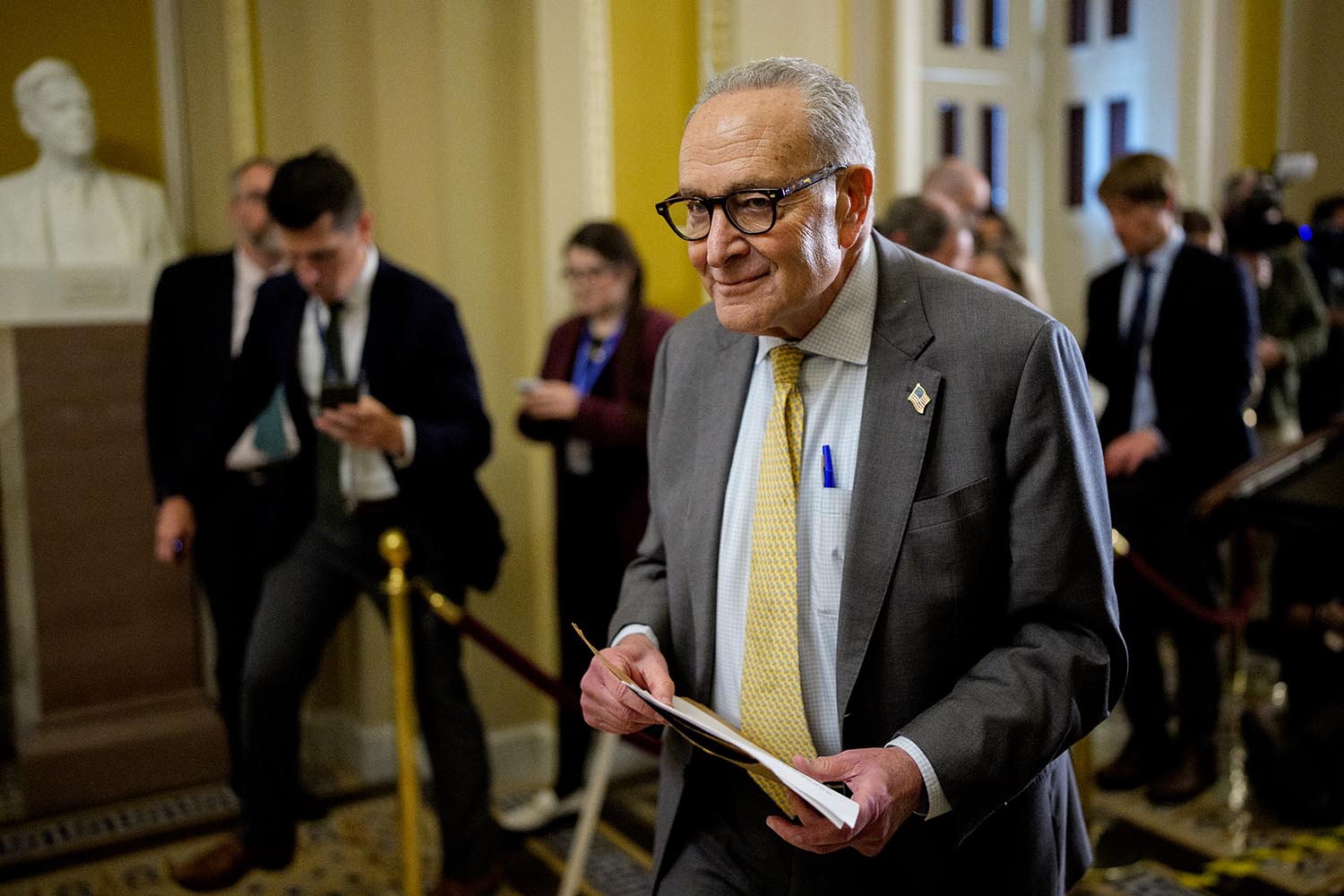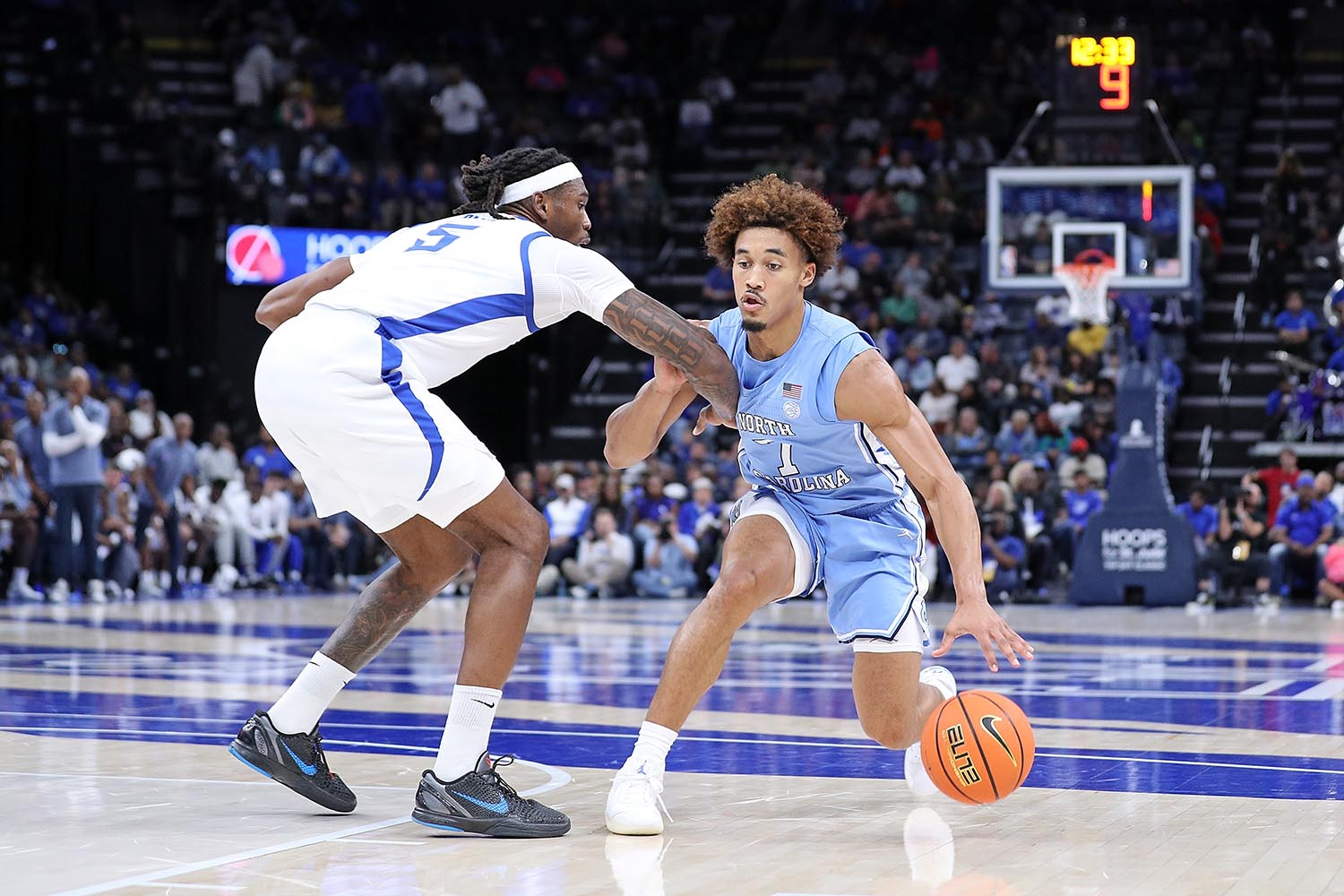Thought of the Day

“A day without laughter is a day wasted.” – Charlie Chaplin


“A day without laughter is a day wasted.” – Charlie Chaplin

By GARY D. ROBERTSON Associated Press
RALEIGH, N.C. (AP) — Republican legislators offered a redrawn U.S. House district map for North Carolina on Thursday, seeking to help President Donald Trump retain GOP control of Congress by attempting to thwart the reelection of the Democrat now in the state’s only swing seat.
State House and Senate GOP leaders unveiled the proposed boundaries in advance of next week’s General Assembly session, stepping into the national fray over mid-decade redistricting that has Democrats and Republicans battling to secure electoral advantages from coast to coast, including Texas and California. The Republicans announced earlier this week that legislators would return to Raleigh to debate and vote on a plan provided in response to Trump’s call to secure more GOP seats ahead of the 2026 midterm elections.
An intensely competitive midterm election looms in which Democrats need to gain just three seats to take control of the House. The president’s party historically has lost seats in midterm elections, something Trump is trying to avoid.
Republicans already approved a North Carolina map in 2023 that resulted in GOP candidates winning 10 of the state’s 14 U.S. House seats in 2024. That compared to a 7-7 seat split between Democrats and the GOP under the map used in 2022.
As anticipated, Thursday’s boundaries appear, based on past election results, to focus on helping the GOP win the 1st District seat in northeastern North Carolina currently held by Democratic Rep. Don Davis. He won a second term in 2024 by less than 2 percentage points.
The retooled 1st District boundaries would take in several coastal counties and remove others inland — including Greene County, Davis’ home county — to create a little more right-leaning 1st District. Greene and others would be placed in a reworked 3rd District currently represented by Republican Rep. Greg Murphy, which based on election results would appear to become a little less GOP friendly.
Other districts to the west would remain intact. Based on results of several past statewide elections attached to the map, Republicans would stand a decent chance to win 11 of North Carolina’s 14 seats.
Republican legislators provided no formal comment on the proposal while inviting online comment from the public. But with an image of the new map, Senate leader Phil Berger wrote Thursday on X that the General Assembly “is ready to help Republicans secure Congress and move @realDonaldTrump’s agenda forward!”
The GOP holds majorities in both the state House and Senate. The state constitution prevents Democratic Gov. Josh Stein from using his veto stamp on redistricting plans.
The national redistricting battle began over the summer when Trump urged Republican-led Texas to reshape its U.S. House districts. After Texas lawmakers acted, California Democrats reciprocated by passing their own plan that still needs voter approval in November.
Other North Carolina Democrats have blasted Republicans for trying to help Trump, accusing the GOP of trying to steal a seat won by Davis, who is one of North Carolina’s three Black representatives. The current 1st District contains a few majority-Black counties. A retooled 1st District could lead to litigation alleging unlawful racial bias.
Redistricting action would happen even while North Carolina GOP legislators are more than three months late on passing a state budget and unable to finalize how to boost Medicaid spending.
“Instead, we’re coming back to talk about redistricting because Republicans believe if they can’t win fair, they’re going to change things and cheat and win that away,” state Democratic state Rep. Sarah Crawford said Thursday at a state Democratic Party news conference.
Davis, a former state legislator and Air Force veteran, mentioned regional concerns in a social media post Thursday evening.
Eastern North Carolina families “are struggling and feel that Washington, D.C., is broken. I understand these concerns all too well,” Davis wrote on X. “As we look at new congressional districts, I am considering every option, drawing on my local roots, experience in the military, and commitment to education.”

By HANNAH SCHOENBAUM Associated Press
Ace Frehley, the original lead guitarist and founding member of the glam rock band Kiss who captivated audiences with his elaborate makeup and smoke-filled guitar, died Thursday. He was 74.
Frehley died peacefully surrounded by family in Morristown, New Jersey, following a recent fall, according to his agent.
Family members said in a statement that they are “completely devastated and heartbroken” but will cherish his laughter and celebrate the kindness he bestowed upon others.
Kiss, whose hits included “Rock and Roll All Nite” and “I Was Made for Lovin’ You,” was known for its theatrical stage shows, with fireworks, smoking instruments and fake blood spewing from the mouths of band members in body armor, platform boots, wigs and signature black-and-white face paint.
Kiss’ original lineup included Frehley, singer-guitarist Paul Stanley, tongue-wagging bassist Gene Simmons and drummer Peter Criss. Band members took on the personas of comic book-style characters — Frehley was known as “Space Ace” and the “Spaceman.” The New York-born entertainer often experimented with pyrotechnics, making his guitars glow, emit smoke and shoot rockets from the headstock.
“We are devastated by the passing of Ace Frehley,” Simmons and Stanley said in a joint statement. “He was an essential and irreplaceable rock soldier during some of the most formative foundational chapters of the band and its history. He is and will always be a part of KISS’s legacy.”
Frehley and his band mates were inducted into the Rock & Roll Hall of Fame in 2014.
As the Kennedy Center’s new chairman, President Donald Trump named Kiss as one of this year’s honorees.
Frehley’s is the first death among the four founding members.
The band was extremely popular, especially in the mid-1970s, selling tens of millions of albums and licensing its iconic look to sell numerous products. “Beth” was its biggest commercial hit in the U.S., peaking at No. 7 on the Billboard Top 100 in 1976.
Frehley left the band in 1982, skipping the years when they took off the makeup and had mixed success. He performed both as a solo artist and with his band, Frehley’s Comet.
But he rejoined Kiss in the mid-1990s for a triumphant reunion and restoration of their original style that came after bands including Nirvana, Weezer and the Melvins had expressed their affection for the band and paid them musical tributes.

By ERIC TUCKER, ALANNA DURKIN RICHER and MICHAEL KUNZELMAN Associated Press
GREENBELT, Md. (AP) — John Bolton, who served as national security adviser to President Donald Trump during his first term and later became a vocal critic of the Republican leader, was charged Thursday with storing top secret records at home and sharing with relatives diary-like notes about his time in government that officials said contained classified information.
The 18-count indictment also suggests classified information was exposed when operatives believed linked to the Iranian regime hacked Bolton’s email account in 2021 and gained access to sensitive material he had shared. A Bolton representative told the FBI at the time that his emails had been hacked, prosecutors say, but did not reveal he had shared classified information through the account or that the hackers now had possession of government secrets.
The indictment sets the stage for a closely watched court case centering on a longtime fixture in Republican foreign policy circles who became known for his hawkish views on American power and who served for more than a year in Trump’s first administration before being fired in 2019 and publishing a scathingly critical book about the president.
Bolton is now the third Trump adversary prosecuted in the last month, meaning the case will unfold against the backdrop of concerns the president is using his Justice Department to pursue political enemies and to spare allies from scrutiny. Bolton foreshadowed that argument in a defiant statement Thursday in which he denied the charges and called them part of an “intensive effort” by Trump to “intimidate his opponents.”
“Now, I have become the latest target in weaponizing the Justice Department to charge those he deems to be his enemies with charges that were declined before or distort the facts,” he said.
Even so, the indictment is significantly more detailed in its allegations than earlier cases against former FBI Director James Comey and New York Attorney General Letitia James. Unlike the other two cases that were filed by a hastily appointed U.S. attorney, this one was signed by career national security prosecutors. And though the investigation burst into public view in August when the FBI searched Bolton’s home in Maryland and his office in Washington, the inquiry was already well underway by the time Trump took office a second time this past January.
The indictment, filed in federal court in Greenbelt, Maryland, alleges that between 2018 and this past August Bolton shared with two relatives more than 1,000 pages of information about his day-to-day activities in government.
The material included “diary-like” entries with information classified as high as top secret that he had learned from meetings with other U.S. government officials, from intelligence briefings or talks with foreign leaders, according to the indictment. After sending one document, Bolton wrote in a message to his relatives, “None of which we talk about!!!” In response, one of his relatives wrote, “Shhhhh,” prosecutors said.
Among the material was information about foreign adversaries that in some cases revealed details about sources and methods used by the government to collect intelligence. One document related to a foreign adversary’s plans for a missile launch, while another detailed U.S. government plans for covert action and included intelligence blaming an adversary for an attack, court papers say.
The two family members were not identified in court papers, but a person familiar with the case who spoke on condition of anonymity to discuss non-public details identified them as his wife and daughter.
“There is one tier of justice for all Americans,” Attorney General Pam Bondi said in a statement. “Anyone who abuses a position of power and jeopardizes our national security will be held accountable. No one is above the law.”
The indictment also suggests Bolton was aware of the impropriety of sharing classified information with family and friends, citing an April news media interview in which he chastised Trump administration officials for using Signal to discuss sensitive military details. Though the anecdote is meant by prosecutors to show Bolton understood the law surrounding government secrets, Bolton’s legal team may also try to point to it to argue a double standard in enforcement since the Justice Department is not known to have opened any investigation into the Signal episode.
Bolton’s attorney, Abbe Lowell, said in a statement that the “underlying facts in this case were investigated and resolved years ago.”
He said the charges stem from portions of Bolton’s personal diaries over his 45-year career and included unclassified information that was shared only with his immediate family and was known to the FBI as far back as 2021.”
“Like many public officials throughout history, Amb. Bolton kept diaries — that is not a crime. We look forward to proving once again that Amb. Bolton did not unlawfully share or store any information,” Lowell said.
Bolton linked the criminal case to an an unsuccessful Justice Department effort, after he left government, to block the publication of his 2020 book “The Room Where It Happened.”
The Trump administration asserted that Bolton’s manuscript, which portrayed Trump as grossly misinformed about foreign policy, contained classified information that could harm national security if exposed. Bolton’s lawyers have said he moved forward with the book after a White House National Security Council official, with whom Bolton had worked for months, said the manuscript no longer contained classified information.
A search warrant affidavit that was previously unsealed said a National Security Council official had reviewed the book manuscript and told Bolton in 2020 that it appeared to contain “significant amounts” of classified information, some at a top-secret level.
“These charges are not just about his focus on me or my diaries, but his intensive effort to intimidate his opponents, to ensure that he alone determines what is said about his conduct,” he said.
Bolton also served in the Justice Department during President Ronald Reagan’s administration and was the State Department’s point man on arms control during George W. Bush’s presidency. Bolton was nominated by Bush to serve as U.S. ambassador to the United Nations, but the strong supporter of the Iraq war was unable to win Senate confirmation and resigned after serving 17 months as a Bush recess appointment. That allowed him to hold the job on a temporary basis without Senate confirmation.
In 2018, Bolton was appointed to serve as Trump’s third national security adviser. But his brief tenure was characterized by disputes with the president over North Korea, Iran and Ukraine.
Those rifts ultimately led to Bolton’s departure, with Trump announcing on social media in September 2019 that he had accepted Bolton’s resignation. Bolton subsequently criticized Trump’s approach to foreign policy and government in his 2020 book, including by alleging that Trump directly tied providing military aid to Ukraine to that country’s willingness to conduct investigations into Joe Biden, who was soon to be Trump’s Democratic 2020 election rival, and members of his family.
Trump responded by slamming Bolton as a “washed-up guy” and a “crazy” warmonger who would have led the country into “World War Six.” Trump also said at the time that the book contained “highly classified information” and that Bolton “did not have approval” for publishing it.
___
Tucker and Durkin Richer reported from Washington.

By STEPHEN GROVES and MARY CLARE JALONICK Associated Press
WASHINGTON (AP) — Senate Democrats rejected for the 10th time Thursday a stopgap spending bill that would reopen the government, insisting they won’t back away from demands that Congress take up health care benefits.
The vote failed Thursday morning on a 51-45 vote, well short of the 60 needed to advance with the Senate’s filibuster rules.
The repetition of votes on the funding bill has become a daily drumbeat in Congress, underscoring how intractable the situation has become. It has been at times the only item on the agenda for the Senate floor, while House Republicans have left Washington altogether. The standoff has lasted over two weeks, leaving hundreds of thousands of federal workers furloughed, even more without a guaranteed payday and Congress essentially paralyzed.
“As we are positioning as two sides that are seemingly dug in on this 16th day of a shutdown, real people are wondering is their government going to be there for them?” said GOP Sen. Lisa Murkowski of Alaska.
Senate Majority Leader John Thune again and again has tried to pressure Democrats to break from their strategy of voting against the stopgap funding bill. It hasn’t worked. And while some bipartisan talks have been ongoing about potential compromises on health care, they haven’t produced any meaningful progress toward reopening the government.
Thune, a South Dakota Republican, has also offered to hold a later vote on extending subsidies for health plans offered under Affordable Care Act marketplaces, but said he would not “guarantee a result or an outcome.”
Democrats say they won’t budge until they get a guarantee on extending the tax credits for the health plans. They warn that millions of Americans who buy their own health insurance — such as small business owners, farmers and contractors — will see large increases when premium prices go out in the coming weeks. Looking ahead to a Nov. 1 deadline in most states, they think voters will demand that Republicans enter into serious negotiations.
“The ACA crisis is looming over everyone’s head, and yet Republicans seem ready to let people’s premiums spike,” said Senate Democratic leader Chuck Schumer in a floor speech.
Meanwhile, Thune was also trying a different tack Thursday with a vote to proceed to appropriations bills — daring Democrats to vote against funding legislation for the Department of Defense which would potentially lead to pay for U.S. military members during the shutdown.
Democrats have rallied around their priorities on health care as they hold out against voting for a Republican bill that would reopen the government. Yet they also warn that the time to strike a deal to prevent large increases for many health plans is drawing short.
When they controlled Congress during the pandemic, Democrats boosted subsidies for Affordable Care Act health plans. It pushed enrollment under President Barack Obama’s signature health care law to new levels and drove the rate of uninsured people to a historic low. Nearly 24 million people currently get their health insurance from subsidized marketplaces, according to health care research nonprofit KFF.
Democrats — and some Republicans — are worried that many of those people will forgo insurance if the price rises dramatically. While the tax credits don’t expire until next year, health insurers will soon send out notices of the price increases. In most states, they go out Nov. 1.
Sen. Patty Murray, the top Democrat on the Senate Appropriations Committee, said she has heard from “families who are absolutely panicking about their premiums that are doubling.”
“They are small business owners who are having to think about abandoning the job they love to get employer-sponsored health care elsewhere or just forgoing coverage altogether,” she added.
Murray also said that if many people decide to leave their health plan, it could have an effect across medical insurance because the pool of people under health plans will shrink. That could result in higher prices across the board, she said.
Some Republicans have acknowledged that the expiration of the tax credits could be a problem and floated potential compromises to address it, but there is hardly a consensus among the GOP.
House Speaker Mike Johnson, R-La., this week called the COVID-era subsidies a “boondoggle,” adding that “when you subsidize the health care system and you pay insurance companies more, the prices increase.”
President Donald Trump has said he would “like to see a deal done for great health care,” but has not meaningfully weighed into the debate. And Thune has insisted that Democrats first vote to reopen the government before entering any negotiations on health care.
If Congress were to engage in negotiations on significant changes to health care, it would likely take weeks, if not longer, to work out a compromise.
Meanwhile, Senate Republicans are setting up a vote Thursday to proceed to a bill to fund the Defense Department and several other areas of government. This would turn the Senate to Thune’s priority of working through spending bills and potentially pave the way to paying salaries for troops, though the House would eventually need to come back to Washington to vote for a final bill negotiated between the two chambers.
It was also an attempt to put a crack in Democrats’ resolve. Thune said Thursday, “If they want to stop the defense bill, I don’t think it’s very good optics for them.”
But Democrats appeared ready to vote against the bill advancing. They charged that Republicans had abandoned bipartisanship in the appropriations process, potentially leaving out funding for other areas of government that are priorities for Democrats.
“We believe that we need a strong defense, but we believe we need strong health care, we need strong safety for the American people, we need strong programs that help them with so many other issues, mental health and education,” Schumer said Thursday.
Connecticut Sen. Chris Murphy, a Democratic member of the Senate Appropriations Committee, said that he wouldn’t vote to “move forward on appropriations bills until they’re serious about stopping health care premiums from going up.”
It left Capitol Hill with a growing sense that an end to the stasis is nowhere in sight.
“So many of you have asked all of us, how will it end?” Johnson said, “We have no idea.”
__
Associated Press writer Kevin Freking contributed reporting.

By TERESA M. WALKER AP Sports Writer
NASHVILLE, Tenn. (AP) — Tennessee coach Rick Barnes saw a chance to bring Duke to campus for the first time in nearly 50 years and jumped at it.
His No. 18 Volunteers host sixth-ranked Duke on Sunday in an exhibition that sold out minutes after tickets went on sale despite the result not counting. It’s much more important to the coaches as a preseason checkup for a pair of programs that finished in the top five last spring.
“I wish we played more of them,” Barnes said. “I really do. I think it would help all of us.”
Barnes has lots of company. The last weekend of October now looks like the second week of the NCAA Tournament with a bunch of games between power conference opponents providing a fresh revenue source along with a chance to test team chemistry during this time of roster overhauls through the transfer portal and players cashing in on their athletic fame.
The star-power games start up on Friday, with No. 1 Purdue at No. 9 Kentucky, No. 25 North Carolina facing No. 8 BYU in Salt Lake City and No. 19 Kansas at No. 11 Louisville. The next day, No. 5 St. John’s plays No. 7 Michigan at Madison Square Garden and on Sunday No. 2 and nattional runner-up Houston plays Mississippi State while the No. 9 North Carolina State women play No. 10 Maryland
There are more games like this before the season opens Nov. 3, like No. 22 Michigan State against No. 4 UConn in Hartford, Connecticut, on Oct. 28 and the No. 11 North Carolina women taking on No. 2. South Carolina in Atlanta.
Exhibitions had been allowed before this season if the proceeds went to charity.
Memphis hosted a doubleheader last October benefiting St. Jude Children’s Research Hospital, and the Tigers play Arkansas on Oct. 27 with the women hosting No. 19 Vanderbilt in the second Hoops for St. Jude Classic.
The NCAA men’s basketball oversight committee approved a rule change in January allowing Division I programs to play two exhibitions without a waiver. Also eliminated was a requirement that the proceeds be donated to charity, and now schools now can split the proceeds however they want.
Belmont coach Casey Alexander initially hoped that all D-I programs would play two exhibitions, giving midmajors like his Bruins a chance to bring an opponent from a power league to campus for an exhibition. The rule change was designed to help programs offset expenses from revenue-sharing.
Yet the only exhibition Belmont has scheduled is Tennessee Tech.
“That’s the reason why you’re seeing the high-profile teams playing each other,” Alexander said. “It’s one more game for them to draw 10- or 15- or 20,000 at home, and therefore a lot of revenue that they can put in their pocket to offset what they’re spending.”
Duke last visited Tennessee on Dec. 7, 1976, and the Volunteers beat the Blue Devils the last time they met in the first weekend of the 2023 NCAA Tournament.
Blue Devils coach Jon Scheyer was looking for the toughest game possible to prepare for a challenging nonconference slate. Visiting Tennessee gives him a chance to learn about his reshaped roster after losing all five starters from a Final Four team, including Associated Press national player of the year and No. 1 overall NBA draft pick Cooper Flagg.
It’s also a game, even if it doesn’t count in the standings, that could resonate all the way to March in preparing the Blue Devils.
“I’m anxious to learn,” Scheyer said. “Without trying to shoot every bullet in the chamber that you have, either. That’s not what we’re trying to do. We’re just trying to make sure we’re true to who we are. It’s going to be interesting.”
Kentucky coach Mark Pope said coaches thought the rule would pass in 2024. He is grateful to finally have the chance to test his Wildcats against No. 1 Purdue and Georgetown in the preseason. Pope even has a number in mind after expanding to 33 games: eight more for 41 a season would be nice.
“It’s fun for our fans. I think it’s elite for us,” Pope said.
There are some power programs playing second exhibitions against neighbors outside the blue blood lines. Purdue hosts Division II Indianapolis on Oct. 29. Indiana scheduled a game against NAIA program Marian while Kansas State will host D-II Newman on Halloween a week after an exhibition against Missouri.
Kansas State coach Jerome Tang said playing a Southeastern Conference program on the road is a great preview for what his Wildcats face this season during the nonconference slate with the likes of Creighton, Mississippi State and Indiana ahead of the Big 12 schedule.
“We might as well start preparing for it early,” Tang said. “Every night in the Big 12, we’re going to play a team with a number next to their name.”
The exhibitions also help replace the secret scrimmages where teams experimented with potential rule changes. Those aren’t all gone, with Vanderbilt facing Virginia this week playing by NBA rules with four 12-minute quarters.
Just how vanilla the exhibitions wind up in terms of schemes and sets remains to be seen.
“You get a chance to experiment a little bit more,” Scheyer said. “I think in this, you know it’s going to be seen. You try to not show everything you have. So it’s a tradeoff.”
___
AP Basketball Writers Aaron Beard and Dave Skretta and AP freelance writer Keith Taylor contributed to this report.

By DENNIS WASZAK Jr. AP Pro Football Writer
EAST RUTHERFORD, N.J. (AP) — Bryce Young’s arrival in Carolina came with huge expectations.
He was the No. 1 pick in the 2023 NFL draft, hoped by the Panthers to be the quarterback to help lead the franchise back to respectability, the playoffs and perhaps someday much more.
Well, small steps first.
The Panthers (3-3) head to New York to play the winless Jets (0-6) on Sunday and look to win three straight games for the first time with Young as their starting quarterback. They also haven’t had a .500 record this deep into a season since they were 5-5 in Cam Newton’s second stint with the team in 2021.
“So proud of this group that just continues to fight and scratch and claw and just get it done,” coach Dave Canales said after the Panthers’ 30-27 win over the Dallas Cowboys last Sunday.
There’s a feeling among the players that things are different now for a team that has a franchise-worst seven-year playoff drought, tied with Atlanta for the NFL’s second-longest active skid behind only the Jets. Young agreed with guard Damien Lewis, who posted on social media that he feels a culture change is underway in Carolina.
“I feel like we’re definitely continuing to build and grow in the right direction,” Young said. “I’m embracing the culture, embracing the ownership and all the little things, and I think us being able to come into our own, it’s been great. It’s been great to be a part of, and it’s been great to be a leader through it.
“So, you know, there’s still work to do. Still so much for us to build off of.”
The Panthers will have to solve their road woes if they hope to keep things rolling. Carolina is 0-3 away from Bank of America Stadium and been outscored 95-45 in those games.
Meanwhile, the Jets are 0-6 for the third time in franchise history and will try to avoid joining the 1996 and 2020 squads as the only teams to drop their first seven games.
Aaron Glenn is the first Jets coach to begin his tenure with six losses, and fans already frustrated with the team’s 14-year playoff drought are already losing patience.
“I understand how it looks on the outside, and the thing is, I told you guys and I told the fans, man, do not let go of the rope,” Glenn said. “The thing I know we’re doing is we’re trying to build a solid foundation so we can consistently try to win.”
Panthers running back Rico Dowdle has been dominant the past two weeks, racking up 389 yards on the ground and 473 yards from scrimmage — both franchise records for a two-game span.
But with regular starter Chuba Hubbard set to return this week from a calf injury, Dowdle could get fewer reps. Canales has remained quiet on his plans on who’ll receive the bulk of carries, but insisted Dowdle will remain part of the mix.
“I think he’s earned everything that he’s done in the last two weeks,” Canales said of Dowdle. “He’s earned the right to help this team, and he will. We’ll find a way to do that. How we do that specifically, I don’t wanna really share those details of it.”
Justin Fields went 9 of 17 for just 45 yards and was sacked nine times, a result of holding onto the ball too long at times, in New York’s 13-11 loss to Denver in London last Sunday. The Jets also finished with a franchise-worst minus-10 net yards passing.
Still, Glenn is sticking with Fields as his starter, looking for the quarterback and coordinator Tanner Engstrand’s struggling unit to bounce back.
“I think I’ll just learn from my mistakes from last game,” Fields said, “and definitely play better this week, for sure.”
Fields and the offense could have an even tougher time getting on track if star wide receiver Garrett Wilson is sidelined.
Wilson is dealing with a knee injury that kept him out of practice early in the week and Glenn said the Jets would see how he’d progress. The fourth-year receiver leads New York with 36 catches for 395 yards and four touchdowns.
But that’s not all: No. 2 wide receiver Josh Reynolds also might not play because of a hip ailment. That could leave the Jets with Allen Lazard, Tyler Johnson and rookie Arian Smith as the only healthy wide receivers on the active roster.
Panthers wide receiver Jalen Coker, who carved a niche last season as an undrafted rookie with 32 receptions for 478 yards and two touchdowns, is set to make his season debut as the team’s slot receiver.
Coker missed the first six games with a quadriceps injury suffered leading up to the season opener, which he called “really unfortunate timing.”
The Panthers have been careful to make sure Coker is completely healed and that his conditioning is at a point where he can play the entire game and be a contributor and not be on a snap count.
The Panthers lost outside linebacker Patrick Jones II, one of their top pass rushers, for the season with a lower back injury this week.
Carolina is expected to turn to rookies Nic Scourton and Princely Umanmielen, the team’s second- and third-round picks, to replace Jones. Both have shown promise, but are now expected to get expanded roles.
___
AP Sports Writer Steve Reed in Charlotte, North Carolina, contributed.

These mini chicken pot pies are the perfect individual-sized dinner for a crisp fall evening. They work especially well for meal prep or on-the-go nights!
1. Preheat oven
Preheat the oven to 400°F and grease 8 spaces in a standard muffin tin.
2. Make the filling
Melt the butter in a pan over medium heat, then add flour and stir for 1 minute to form a roux. Next, slowly whisk in the chicken broth and milk. Stir until thickened (2–3 minutes). Add the cooked chicken, frozen vegetables, garlic powder, salt and pepper. Simmer for 2–3 more minutes, then remove from the heat.
3. Prepare the crust
Roll out the pastry or pie crust, then cut 8 circles (about 4–5 inches wide) and press them into the muffin tin cups to form the base. Cut 8 smaller circles (about 2.5–3 inches) for the tops as well.
4. Assemble
Spoon the filling evenly into each crust-lined cup, then place the smaller crust circles on top and gently press edges to seal (you can crimp with a fork if desired). Cut a small slit in the top of each pie to let steam escape.
5. Egg wash (optional)
Beat the egg and brush over the tops for a golden finish.
6. Bake and serve
Put the mini pot pies in the preheated oven and bake for 20–25 minutes, or until the crust is golden brown. Then, let them cool for 5 minutes and enjoy!

By COLLIN BINKLEY AP Education Writer
WASHINGTON (AP) — For a generation of young Americans, choosing where to go to college — or whether to go at all — has become a complex calculation of costs and benefits that often revolves around a single question: Is the degree worth its price?
Public confidence in higher education has plummeted in recent years amid high tuition prices, skyrocketing student loans and a dismal job market — plus ideological concerns from conservatives. Now, colleges are scrambling to prove their value to students.
Borrowed from the business world, the term “return on investment” has been plastered on college advertisements across the U.S. A battery of new rankings grade campuses on the financial benefits they deliver. States such as Colorado have started publishing yearly reports on the monetary payoff of college, and Texas now factors it into calculations for how much taxpayer money goes to community colleges.
“Students are becoming more aware of the times when college doesn’t pay off,” said Preston Cooper, who has studied college ROI at the American Enterprise Institute, a conservative think tank. “It’s front of mind for universities today in a way that it was not necessarily 15, 20 years ago.”
A wide body of research indicates a bachelor’s degree still pays off, at least on average and in the long run. Yet there’s growing recognition that not all degrees lead to a good salary, and even some that seem like a good bet are becoming riskier as graduates face one of the toughest job markets in years.
A new analysis released Thursday by the Strada Education Foundation finds 70% of recent public university graduates can expect a positive return within 10 years — meaning their earnings over a decade will exceed that of a typical high school graduate by an amount greater than the cost of their degree. Yet it varies by state, from 53% in North Dakota to 82% in Washington, D.C. States where college is more affordable have fared better, the report says.
It’s a critical issue for families who wonder how college tuition prices could ever pay off, said Emilia Mattucci, a high school counselor at East Allegheny schools, near Pittsburgh. More than two-thirds of her school’s students come from low-income families, and many aren’t willing to take on the level of debt that past generations accepted.
Instead, more are heading to technical schools or the trades and passing on four-year universities, she said.
“A lot of families are just saying they can’t afford it, or they don’t want to go into debt for years and years and years,” she said.
Education Secretary Linda McMahon has been among those questioning the need for a four-year degree. Speaking at the Reagan Institute think tank in September, McMahon praised programs that prepare students for careers right out of high school.
“I’m not saying kids shouldn’t go to college,” she said. “I’m just saying all kids don’t have to go in order to be successful.”
American higher education has been grappling with both sides of the ROI equation — tuition costs and graduate earnings. It’s becoming even more important as colleges compete for decreasing numbers of college-age students as a result of falling birth rates.
Tuition rates have stayed flat on many campuses in recent years to address affordability concerns, and many private colleges have lowered their sticker prices in an effort to better reflect the cost most students actually pay after factoring in financial aid.
The other part of the equation — making sure graduates land good jobs — is more complicated.
A group of college presidents recently met at Gallup’s Washington headquarters to study public polling on higher education. One of the chief reasons for flagging confidence is a perception that colleges aren’t giving graduates the skills employers need, said Kevin Guskiewicz, president of Michigan State University, one of the leaders at the meeting.
“We’re trying to get out in front of that,” he said.
The issue has been a priority for Guskiewicz since he arrived on campus last year. He gathered a council of Michigan business leaders to identify skills that graduates will need for jobs, from agriculture to banking. The goal is to mold degree programs to the job market’s needs and to get students internships and work experience that can lead to a job.
Bridging the gap to the job market has been a persistent struggle for U.S. colleges, said Matt Sigelman, president of the Burning Glass Institute, a think tank that studies the workforce. Last year the institute, partnering with Strada researchers, found 52% of recent college graduates were in jobs that didn’t require a degree. Even higher-demand fields, such as education and nursing, had large numbers of graduates in that situation.
“No programs are immune, and no schools are immune,” Sigelman said.
The federal government has been trying to fix the problem for decades, going back to President Barack Obama’s administration. A federal rule first established in 2011 aimed to cut federal money to college programs that leave graduates with low earnings, though it primarily targeted for-profit colleges.
A Republican reconciliation bill passed this year takes a wider view, requiring most colleges to hit earnings standards to be eligible for federal funding. The goal is to make sure college graduates end up earning more than those without a degree.
Others see transparency as a key solution.
For decades, students had little way to know whether graduates of specific degree programs were landing good jobs after college. That started to change with the College Scorecard in 2015, a federal website that shares broad earnings outcomes for college programs. More recently, bipartisan legislation in Congress has sought to give the public even more detailed data.
Lawmakers in North Carolina ordered a 2023 study on the financial return for degrees across the state’s public universities. It found that 93% produced a positive return, meaning graduates were expected to earn more over their lives than someone without a similar degree.
The data is available to the public, showing, for example, that undergraduate degrees in applied math and business tend to have high returns at the University of North Carolina at Chapel Hill, while graduate degrees in psychology and foreign languages often don’t.
Colleges are belatedly realizing how important that kind of data is to students and their families, said Lee Roberts, chancellor of UNC-Chapel Hill, in an interview.
“In uncertain times, students are even more focused — I would say rightly so — on what their job prospects are going to be,” he added. “So I think colleges and universities really owe students and their families this data.”
___
The Associated Press’ education coverage receives financial support from multiple private foundations. AP is solely responsible for all content. Find AP’s standards for working with philanthropies, a list of supporters and funded coverage areas at AP.org.


A dish of carrot hastily cooked may still have soil uncleaned off the vegetable so take your time and do things properly rather than rushing and making mistakes.